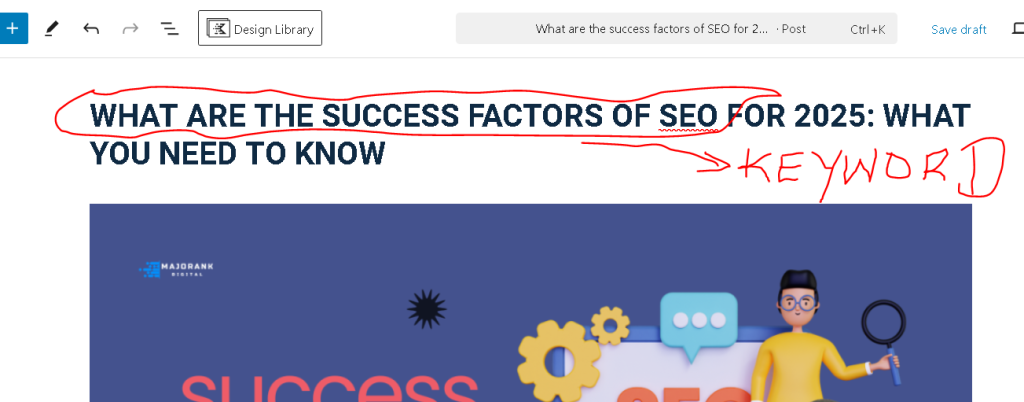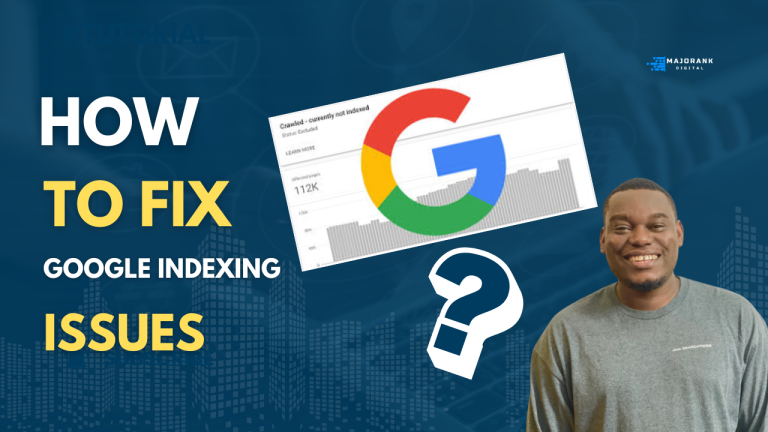
If you want your website to stand out in 2025, understanding how Google ranks pages is essential. Google updates its algorithm regularly, and staying on top of these changes can make a huge difference in your site’s visibility. Here’s a simple breakdown of the most important SEO ranking factors for 2025, along with some real-world examples and stats to keep things relatable.
What are the success factors of SEO?
1. High-Quality Content is Still King
Google loves websites that provide valuable, engaging, and original content. This hasn’t changed, but the way Google evaluates content has become more sophisticated.
- Why it Matters: Websites with top-notch content get 3.5 times more traffic than those that rely on low-quality material.
- What Google Looks For:
- Content that answers user questions directly.
- Fresh and regularly updated articles.
- Content that’s easy to read and visually appealing (think images and infographics).
- Pro Tip: Try publishing new content twice a week or updating older posts with current information to stay relevant.
2. Keywords in Titles Still Pack a Punch

Your meta title (the title that appears in search results) is one of the first things users see—and Google still considers it important.
- The Data: Pages with keywords in their title tags rank 15% higher than those without.
- How to Use It:
- Keep your titles short, clear, and relevant.
- Add one or two keywords naturally. For example, “Best Hiking Shoes for 2025” is better than “Hiking Shoes.”
Must Read – How Important is Guest Posting in Link Building
3. Backlinks: Quality Over Quantity

Backlinks—links to your site from other websites—used to be the biggest factor in SEO. Now, quality matters more than the number of links.
- The Numbers:
- Websites with backlinks from high-authority sites see a 34% increase in search visibility.
- A diverse backlink profile (links from different kinds of websites) boosts rankings by 3%.
- Pro Tip: Focus on earning links from trusted sources by creating content people want to share, like in-depth guides or original research.
See More – Why Link Building is Important
4. Fresh Content Gets Extra Love
Google rewards websites that keep their content up-to-date. This is especially true for topics that change frequently, like technology, health, or finance.
- Why It Works: Pages updated within the past 6 months perform 6% better on average than outdated ones.
- How to Stay Fresh:
- Refresh old blog posts with updated stats or examples.
- Add new sections to evergreen content (posts that stay relevant year after year).
5. User Engagement Matters
Google tracks how visitors interact with your website to judge its quality. Metrics like time spent on the page, bounce rate, and click-through rate (CTR) all play a role.
- Did You Know?: Pages with higher user engagement are 11% more likely to land on page one of Google.
- How to Improve Engagement:
- Write content that keeps readers interested, like lists, how-to guides, and FAQs.
- Break up long blocks of text with headings, images, and bullet points.
6. Technical SEO: The Engine Behind the Scenes
Technical SEO ensures that Google’s bots can crawl and index your website easily. It might sound complicated, but some basics go a long way.
- Key Focus Areas:
- Page Speed: A one-second delay can lower conversions by 7%.
- Mobile-Friendly Design: Over 60% of Google searches come from mobile devices.
- Security: Sites with SSL certificates (https) are seen as more trustworthy by users and Google.
- Pro Tip: Use tools like Google Search Console and PageSpeed Insights to fix errors and optimize performance.
7. Mobile Optimization is Non-Negotiable
Google now ranks sites based on their mobile version first. If your website isn’t easy to use on phones, you’re at a big disadvantage.
- Stats That Matter:
- Mobile-friendly sites rank 32% higher than non-optimized ones.
- Over 70% of users will leave a site if it doesn’t work well on mobile.
- What to Do:
- Test your site on multiple devices.
- Make sure buttons and menus are easy to tap, and that text is legible without zooming.
8. Trustworthiness is Critical
Google has become stricter about the accuracy and credibility of content, especially for sensitive topics like health or money. This is part of Google’s E-A-T (Expertise, Authority, Trustworthiness) principles.
- How to Build Trust:
- Use reputable sources to back up claims.
- Add author bios that showcase expertise.
- Ensure your site has up-to-date security measures.
Note: Trustworthy sites see 23% more engagement and 15% more repeat visitors than sites with questionable credibility.
9. Answer Engine Optimization (AEO) for Voice and Snippets
With the rise of voice searches (e.g., “Hey Google, what’s the best recipe for pancakes?”), optimizing for featured snippets and voice queries is crucial.
- What Works:
- Write in a conversational tone.
- Use headers and bullet points to organize information.
- Answer common questions directly in 40–60 words.
- Stat Spotlight: Voice search results load 52% faster than average web pages.
10. Page Speed and Security: The Basics

Google has made it clear that websites need to be fast and secure to rank well.
- Page Speed: Faster websites rank higher because they improve user experience.
- Fact: 53% of users will leave a page that takes more than 3 seconds to load.
- Security: Sites without SSL certificates are flagged as unsafe, which can hurt rankings.
Bringing It All Together
To succeed in SEO in 2025, you need to focus on the big picture: create great content, optimize for mobile, stay technically sound, and keep your audience engaged. Here’s a quick recap:
- Post high-quality, fresh content regularly.
- Use keywords wisely in titles and descriptions.
- Earn backlinks from reputable sites.
- Ensure your website is fast, secure, and mobile-friendly.
- Optimize for voice search and featured snippets.
According to FirstPageSage, the graph below shows the percentage of how the 10 factors mentioned in this article affects Google SEO ranking.

By following these steps, you’ll not only improve your Google rankings but also provide a better experience for your audience—because at the end of the day, SEO is about people, not just algorithms.
Note: Most of the information displayed here are well researched and sources are referenced to for more information.






